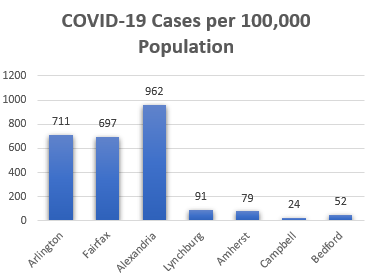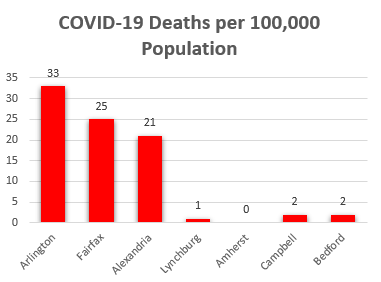by James A. Bacon
Writing for the Washington Post means never having to say you’re sorry. If you’re looking for examples, consider the case of Jerry Falwell Jr. and his decision to keep Liberty University open during the COVID-19 epidemic, even as virtually all other colleges and universities were shutting down.
“This public response indicates the staggering level of ignorance that informs Falwell’s leadership,” opined columnist Michael Gerson. “It is possible for students with mild or unnoticeable symptoms to spread the disease. … Yes, the fatality rate of infected colleges students is likely to be low. Yes places with broad community spread are more likely to see infection of the elderly and vulnerable, who are more likely to fill premature graves.”
“Irresponsible decisions like Jerry Falwell Jr.’s put untold numbers of people at risk,” ran the headline of a WaPo editorial. “These foolhardy, irresponsible decisions endanger not just those who … resumed their college studies but untold others who now run the risk of the novel coronavirus being passed on to them and their families.”
Liberty University moved most of its classes online. About 1,200 students made the choice to return. The New York Times reported that nearly a dozen students promptly came down “with symptoms that suggested Covid-19,” a factoid that was repeated endlessly in the media and mutated into the assertion that a dozen students actually had contracted the virus.
After provoking the usual hysteria, the Washington Post, New York Times, cable news and the rest of the hit-and-run media moved on. Only Wall Street Journal columnist William McGurn thought to tell the rest of the story.
So what actually happened? To start with, only one student tested positive for coronavirus. … Mr. Falwell says no [other] infections were traced back to campus. No Liberty student living on campus tested positive, and no staffer stationed on campus tested positive.
But what about all those infected-but-symptom-free students who spread the virus in the broader community? Here’s the latest data from the Virginia Department of Health dashboard.
 It turns out that the rate of confirmed COVID-19 cases per 100,000 population in Lynchburg and surrounding counties (Amherst, Campbell and Bedford) is a tiny fraction of the rate in Washington Post country. For purposes of comparison, I selected Arlington, Alexandria, and Fairfax, all places where the ethos of the governing class and correct thinking about COVID-19 is in concert with that of the Washington Post.
It turns out that the rate of confirmed COVID-19 cases per 100,000 population in Lynchburg and surrounding counties (Amherst, Campbell and Bedford) is a tiny fraction of the rate in Washington Post country. For purposes of comparison, I selected Arlington, Alexandria, and Fairfax, all places where the ethos of the governing class and correct thinking about COVID-19 is in concert with that of the Washington Post.
 And here is the hospitalization rate per 100,000 population. Pretty much the same story.
And here is the hospitalization rate per 100,000 population. Pretty much the same story.
 And last but not least, we have the death rate per 100,000 population. If anything, the differential is even more pronounced than for the other metrics.
And last but not least, we have the death rate per 100,000 population. If anything, the differential is even more pronounced than for the other metrics.
In other words, there is no discernible community impact from Falwell’s decision to keep Liberty University open. Indeed, there is only one reasonable conclusion to draw: You are far safer from COVID-19 if you live in the environs of Liberty University than if you live in Washington Post country. The gap between the pundits’ hyper-ventilating warnings of catastrophe and reality could not be more profound.
Washington Post pundits are, as the old saying goes, often wrong but never in doubt. They are smug, arrogant and utterly convinced of their intellectual superiority. They live in such a bubble that they can’t conceive of the possibility that a fundamentalist, creationist, bible-thumping rube like Falwell could possibly know what he’s doing. They make their grand pronouncements, foment ridicule, and move on to the next culture-war target without ever revisiting their predictions to see if they came true.
If Falwell and members of the Liberty University community can be described as the “deplorables,” then Gerson, the WaPo editorial writers and like-minded brethren are the “insufferables.” Their haughty sense of superiority might be bearable if they weren’t so quick to tell everyone else how to live their lives — and call upon the coercive power of the state to enforce their predilections. But they have power over the rest of us, and that is why we resent them so.



